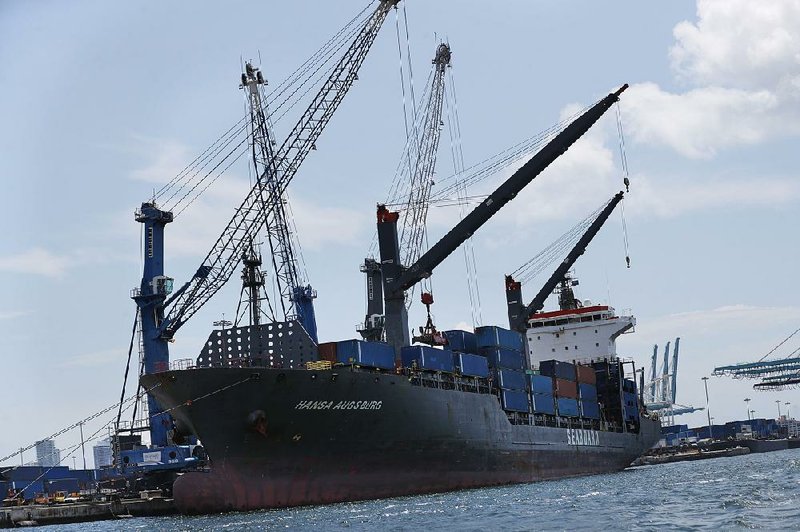WASHINGTON -- The U.S. trade deficit widened in August for the first time in three months as exports increased but imports increased more. The politically sensitive gap with China in the trade of goods narrowed.
The Commerce Department said Friday that the gap between what the United States buys and what it sells abroad rose 1.6% to $54.9 billion from $54 billion in July. The deficit had fallen in June and July. But it is still up for the year despite President Donald Trump's attempts to push it down by imposing taxes on imports and waging a trade war with China.
Exports blipped up 0.2% in August to $207.9 billion. Imports increased 0.5% to $262.8 billion on a big increase in shipments of cellphones, which are scheduled to be hit with new tariffs in December as part of the standoff with China.
From January through August, the deficit rose 7% to $428.7 billion from $400.4 billion a year earlier.
The goods deficit with China dropped 3.1% in August to $31.8 billion and is down 11.4% so far this year.
The U.S. and China are locked in a dispute over American allegations that China uses predatory tactics -- including cybertheft -- in a drive to supplant U.S. technological dominance. Trump has added and increased tariffs on more than $360 billion in Chinese imports and is planning to hit another $160 billion in December. China has retaliated with its own tariffs on imported American products.
U.S. and Chinese negotiators are expected to meet for the 13th time next week to try to resolve the dispute, which has shaken global financial markets and cast gloom over the world economy.
In addition to sparring with China, Trump also has imposed import taxes on foreign steel and aluminum and is threatening to tax imported autos.
Trump views America's persistent trade deficits as a sign of economic weakness and the result of unfair trade agreements.
Mainstream economists say the trade gap is the product of economic forces that don't respond much to changes in trade policy: Americans consume more than they produce, and imports fill the gap. A persistently strong U.S. dollar -- it's up about 1.7% this year against the currencies of U.S. trading partners -- also puts American exporters at a price disadvantage in foreign markets.
In August, the United States recorded a $74.4 billion deficit in the trade of goods such as cars and appliances. But it ran a $19.5 billion surplus in the trade of services such as banking and education. The services surplus was the lowest since February 2016; services imports hit a record $49.8 billion in August.
In Europe on Friday, trade officials said they hope to engage the U.S. in talks on the new tariffs it has imposed on the European Union, but are ready to respond with taxes on American goods if needed.
German Foreign Minister Heiko Maas said the U.S. government is "going down the path of confrontation," after the Trump administration added hefty taxes to some EU goods.
The U.S. imposed the tariffs after getting approval from the World Trade Organization over European subsidies for plane-maker Airbus. The EU is expecting a similar ruling over U.S. subsidies for Boeing that would allow it to set tariffs on American goods.
"The EU must react and probably raise punitive tariffs itself after WTO approval," Maas wrote on Twitter, in an apparent reference to a similar World Trade Organization case involving Boeing.
Maas, however, said that the EU "remains prepared to jointly negotiate rules for subsidies to the aircraft industry."
"We can still avert further damage," he wrote.
The U.S. tariffs do not go into effect before Oct. 18, leaving some space for negotiations.
The Spanish government echoed that hope.
Minister of Agriculture Luis Planas said that "there is still a margin for negotiation."
"The government of Spain will bring to bear all the pressure [it can]," he said.
Planas said Spain was going to push the European Commission to have the agricultural products removed from the American list.
He said the government would be supporting its producers of olive oil, olives, pork products and cheese, among the businesses most vulnerable to the U.S. tariffs.
Business on 10/05/2019
